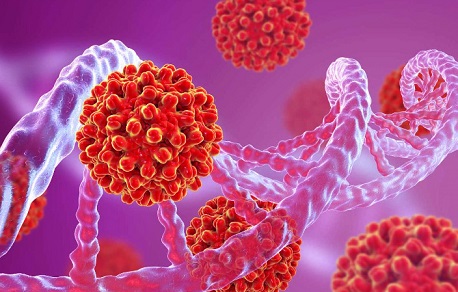Nikhil Prasad Fact checked by:Thailand Medical News Team Oct 22, 2024 5 months, 3 weeks, 1 day, 7 hours, 57 minutes ago
Medical News: Researchers discover how a protein modification boosts the body's immune response to viral infections.
Researchers from the Nanjing Medical University in China have made an important discovery that could improve how we fight certain viral infections. A recent study led by teams from the Department of Gynecology at the Nanjing Maternity and Child Health Care Hospital and the Department of Microbiology and Changzhou Medical Center focused on the body's innate immune system. They found that a specific protein modification, called lactylation, plays a vital role in enhancing the body's immune response to viruses like herpes and the mpox virus (MPXV).
 New Study Unveils Key Mechanism in Fighting Herpesviruses and Mpox Virus
What Is Lactylation and Why It Matters
New Study Unveils Key Mechanism in Fighting Herpesviruses and Mpox Virus
What Is Lactylation and Why It Matters
Lactylation is a newly identified form of protein modification, and it has been found to significantly impact how proteins work in the body. In this study, researchers show that this modification affects a specific enzyme known as ALKBH5, which is already known for its role in controlling immune responses. ALKBH5 is an RNA demethylase, meaning it helps remove certain chemical modifications from RNA, the molecules that carry genetic information used to create proteins. This new research covered in this
Medical News report reveals that when ALKBH5 undergoes lactylation, it becomes even more efficient in supporting the immune system.
This study is important because it explains a previously unknown mechanism by which our bodies can fight off viral infections. DNA viruses like herpes simplex (HSV-1) and Kaposi’s sarcoma-associated herpesvirus (KSHV), as well as the mpox virus, represent significant public health threats. Understanding the biological processes behind how we defend ourselves from these viruses is crucial for developing more effective treatments.
The Role of ALKBH5 in Innate Immunity
The study focused on ALKBH5 and its role in the body’s innate immune system, which is the first line of defense against infections. The researchers discovered that when viruses infect the body, ALKBH5 becomes modified through lactylation.
This modification happens due to the interaction with two other enzymes - ESCO2, which adds the lactylation, and SIRT6, which removes it. During an infection, the balance shifts, allowing ALKBH5 to become more lactylated.
Once lactylated, ALKBH5 has a stronger effect on a specific messenger RNA (mRNA) molecule called interferon-beta (IFN-β). This molecule plays a critical role in the body's response to viral infections by triggering the production of proteins that help stop viruses from spreading. Lactylated ALKBH5 helps remove chemical markers from the mRNA, allowing it to produce more of the IFN-β protein. This increased production leads to a stronger immune response, helping to prevent the viruses from replicating and spreading.
Key Findings of the Study
One of the most exciting findings from the study is that by increa
sing ALKBH5 lactylation, either by boosting ESCO2 or reducing SIRT6 levels, the immune response to viruses can be significantly improved. The study showed that this modification enhances the production of IFN-β, making the immune system more efficient in combating DNA herpesviruses such as HSV-1 and KSHV, as well as the mpox virus.
In lab experiments, overexpression of ESCO2 or depletion of SIRT6 led to more robust lactylation of ALKBH5, which in turn strengthened the body's immune response by promoting IFN-β mRNA production. This suggests that manipulating these enzymes could be a potential strategy for enhancing the body’s natural defense mechanisms against viral infections.
What This Means for the Future of Viral Infection Treatment
The findings from this study open up new possibilities for the development of antiviral therapies. By targeting the lactylation process and manipulating the enzymes involved, scientists could potentially create treatments that help the body fight off viruses more effectively. This is particularly important for infections that currently have limited treatment options, like herpes and the mpox virus.
Conclusion
In conclusion, the discovery that lactylation of ALKBH5 enhances the body’s innate immune response offers a promising new avenue for research into antiviral treatments. The study has not only deepened our understanding of how our immune system fights off viral infections but also highlighted a potential new target for therapeutic strategies. By further investigating the role of enzymes like ESCO2 and SIRT6, scientists may be able to develop new ways to boost the body’s ability to fend off dangerous viruses like herpes and the mpox virus.
The study findings were published in the peer-reviewed journal: PNAS
https://www.pnas.org/doi/10.1073/pnas.2409132121
For the latest research news, keep on logging to Thailand
Medical News.
Read Also:
https://www.thailandmedical.news/news/new-insights-into-herpesvirus-protein-family-could-lead-to-new-treatments
https://www.thailandmedical.news/news/understanding-how-gut-viruses-affect-the-brain
